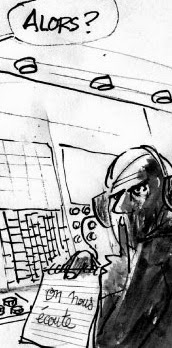[Up, Down]
Reminder 
[Up, Down]

| Fnord is not in the OED, but Old English fnast (noun - breath), fnast (verb - breathe, snort), & fnese (verb - snort, puff, sneeze) are; and breath being a euphemism for spirit ... well - close to the bone let's say; or, close enough for the girls I go with. [I think I might have tried to read 'The Illuminatus' once upon a time and gave up. Someone must've shown me the bit where fnord is described (I guess?), or maybe just told me about it. I thought it was Kurt Vonnegut but I can't find it anywhere there. ... So once again I've simply got it wrong. Oh well. Let's say it is Vonnegut, and let's further say that it means the subjectively fearsome experience of taking in ostensible 'truth' which is understood not to be true in any degree. Not Orwell's doublespeak - some other kind of thing - doublespeak plus second degree cognitive dissonance thrown in but without a whisper of an objective correlative ... singular subjective let's say. Muddled; not a fnord at all. Nothing like a fnord. Not even approximately. And the stupid f'un old hippie doesn't even bother trying to sort it out! Doh! There is a (threatened with deletion) Wikipedia article on the subject. I have saved a copy. In the event that they do delete it I will re-post it somewhere.] Vonnegut's Ice-9 is just 180° out of phase, not shabby; and understandable since the dramatic effect of making a phenomenon mostly experienced as gradual (freezing) become instantaneous is greater than the reverse - making a phenomenon expeienced as quick (fire), say, slow down - which is the case. Who knows? Maybe it was intentional.
       
  First paragraphs of Acknowledgements to two books:
Not a fair comparison of course, but if Daniel Wojcik thought it would be a good idea to publish a book on apocalypse a few years before the millennium (as I now suspect - 'suspect' mind you, not 'know') and so started 'researching' in 1994 or 5 ... Well, you get the idea. And this suspicion having entered, colours everything. Read the bit above carefully. Consider the repeated 'this project'. Then there's the rest of the book. Dreck! Finally, in the last few pages, he offers up four broad categories that don't really divide the ground very well looking like they came out of a high-school essay of some kind. I thought they would have at least belonged up front. The provenance may be interesting: Someone sent me 'The Portable Atheist' a compendium edited by Christopher Hitchens. Passed through Philip Larkin's 'Aubade' and eventually I got round to what seemed the best in it: Ian McEwan 'End of the World Blues' ... which, curiously, looped back again to Aubade. "One of the supreme secular meditations on death is Larkin’s Aubade," says McEwan. Oh? Is it? Here, try this: No touch or taste or smell, nothing to think with,Supreme perhaps but not sublime. McEwan also praises this Daniel Wojcik guy, calls him a 'scholar' and his book 'The end of the world as we know it' a "brilliant account of apocalyptic thought in America" - neither is borne out by the text in my opinion. Maybe I will post some excerpts after a while. The best story I have seen from Ian McEwan (having now read a handful of his novels) comes from the 'On Chesil Beach' page in Wikipedia: In a BBC Radio 4 interview, McEwan admitted to taking a few pebbles from Chesil Beach and keeping them on his desk while he wrote the novel. Protests by conservationists and a threat by Weymouth and Portland borough council to fine him £2,000 led the author to return the pebbles. "I was not aware of having committed a crime," he said. "Chesil Beach is beautiful and I'm delighted to return the shingle to it."The personal cooling; the planetary heating. Frost's poem 'Fire and Ice' comes to mind ... but I can't remember which side wins in that one? Maybe it's a draw ... or, or ... both! The human hearts are frozen and cannot speak, and the hot desire brings us down. Is that it? |
[Up, Down]










No comments:
Post a Comment